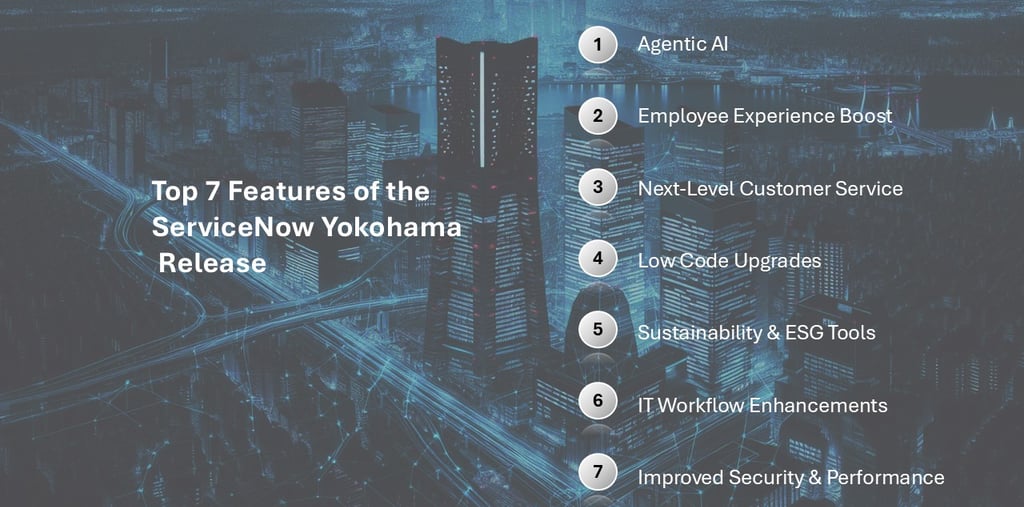
Exploring the ServiceNow Yokohama Release: Key Updates for IT Leaders, Developers, and Businesses
It’s the question that’s been on everyone’s mind in the ServiceNow community ever since the Xanadu Release dropped. The wait is over! The ServiceNow Yokohama release is finally here, bringing cutting-edge AI-powered innovations designed to enhance automation, workflows, and enterprise efficiency.
From AI-powered capabilities to smarter Strategic Portfolio Management (SPM) and enhanced security and compliance features, the ServiceNow Yokohama release takes efficiency, automation, and user experience to the next level. Among its standout features is the AI Agent Studio, a game-changing enhancement that empowers businesses to deploy AI models seamlessly within the Now Platform.
Whether you are an IT leader, a CIO, or a service management professional, understanding the business value of upgrading to ServiceNow Yokohama is crucial. It offers revolutionary AI-powered features that can take productivity and cost savings for organizations across industries to the next level.
In this blog post, we’ll explore some of the key updates in the ServiceNow Yokohama release in more detail. We’ll also evaluate how organizations can leverage these enhancements to stay ahead in 2025 and beyond. Let’s dive straight into why the ServiceNow Yokohama release is the most exciting ServiceNow upgrade so far!


The Top ServiceNow Yokohama Upgrades Across Key ServiceNow Modules
Key Enhancements in IT Service Management and Beyond
ITSM Success Dashboard:
With the Yokohama release, tracking the effectiveness of your ITSM initiatives is easier than ever. The ITSM Success Dashboard now includes predefined success metrics for AI Agents, enabling organizations to measure performance more precisely and drive continuous improvement across service operations.
Major Incident Management Record Page Enhancements:
Yokohama introduces significant improvements to the Major Incident Management record page. Teams can now improve communication workflows with features like ad hoc updates and integrated major incident playbooks. Additionally, the inclusion of the DEX Desktop Assistant provides a new, streamlined channel for real-time updates during critical incidents.
DevOps Change Velocity:
DevOps gets a boost with enhanced change velocity capabilities, thanks to deeper automation and intelligent workflows. Seamless integration with the Harness orchestration platform allows teams to automatically discover Harness pipelines and accelerate change processes with minimal manual intervention.
Digital Product Release Management:
Product teams now benefit from greater transparency and efficiency in the release process. The Yokohama release enables automated release readiness checks, comprehensive visibility into the entire release lifecycle, and more consistent planning and delivery of product updates.
Network Experience Monitoring:
The new Network Experience feature offers powerful analytics tools for monitoring network and application performance. By identifying bottlenecks early and addressing potential issues proactively, organizations can ensure a smooth and uninterrupted digital experience for end users.
Digital Experience Score (DEX Score):
Yokohama introduces the DEX Score dashboard, a unified view that combines technical health metrics, user sentiment, and service experience scores across devices and applications. This holistic insight helps organizations continually improve the digital experiences of their employees.
IT Operations Management (ITOM) Enhancements in Yokohama
Enhanced Service Observability:
The Yokohama release brings significant upgrades to Service Observability, empowering teams to consolidate critical signals, connect workflows, and boost operational agility and reliability. By linking application changes to the underlying infrastructure, organizations can better assess potential impact (blast radius), reduce Mean Time to Resolution (MTTR), and track service performance against business objectives.
CSDM 5.0 and API Advancements:
With the introduction of Common Service Data Model (CSDM) 5.0, Yokohama strengthens CMDB capabilities by expanding unified data models across internal processes and external services. This enables smoother collaboration between human users and AI agents. Additionally, new tools like API Insights and API Service Graph Connectors provide greater transparency and control over APIs, helping organizations manage risk, maintain compliance, and seamlessly integrate APIs into key IT workflows such as change and service management.
ITOM Health Improvements:
Yokohama enhances ITOM Health with more powerful data integration, automation, and visibility tools. One major improvement is the new Splunk Polling data input, which allows for real-time ingestion of pre-processed data from Splunk, enabling faster insights. The release also introduces Group Automation features and streamlined access to log data connectors via the Integrations Launchpad, enhancing both operational efficiency and automation across environments.
Governance, Risk, and Compliance (GRC) Enhancements in Yokohama
Smart Assessment Engine:
The Yokohama release introduces the Smart Assessment Engine, revolutionizing compliance case management by automating risk assessments within the platform. It intelligently calculates assessment scores based on both user responses and data types, while also pre-filling answers to accelerate evaluation, streamline workflows, and support faster, more accurate decision-making.
Digital Operational Resilience Incident Reporting (DORA):
To support compliance with the Digital Operational Resilience Act (DORA), Yokohama delivers a purpose-built automated workflow for IT and security incident reporting. This enhancement automatically triggers compliance cases, sends notifications, and initiates assessments, with integrated CMDB data to provide full context. It also simplifies documentation by auto-generating initial, intermediate, and final reports—ensuring incidents are properly classified and reported in line with regulatory expectations.
Third-Party Risk Management (TPRM):
Yokohama brings significant improvements to third-party risk management by enabling the reuse of questionnaire responses for entities and engagements tied to the same vendor, reducing repetitive work. Additionally, organizations can now streamline assessments with a Microsoft Excel-based import/export feature, allowing vendors to complete and submit questionnaires via the portal more easily.
Alert Correlation Using Network Traffic:
With this update, teams can proactively address operational risks by analyzing network traffic to uncover hidden patterns and correlate related alerts—without needing a fully mature CMDB. This reduces alert noise, helps prioritize issues, and supports faster incident resolution by grouping relevant alerts before they escalate.
Customer Service Management (CSM) Enhancements in Yokohama
Improved Voice Interaction and Call Controls:
With Yokohama, agents gain more efficient control over voice interactions. Through integrated third-party CCaaS call controls, they can easily manage transfers, conference calls, holds, and mute functions—all from within the universal inbox. The workspace now supports quick access to consult and blind transfers, offering a consistent and streamlined experience across all communication channels.
Embedded CCaaS Capabilities:
ServiceNow now offers deeper integration with leading CCaaS platforms like Genesys. Agents can access AI-powered tools and automation features directly within the Agent Workspace, allowing them to resolve customer issues faster without switching between systems—improving both efficiency and user satisfaction.
Centralized Routing via Third-Party CCaaS:
The Yokohama release introduces unified chat and case routing through third-party CCaaS platforms, enabling centralized management of customer interactions. By consolidating routing logic across channels, businesses can reduce operational complexity, minimize administrative effort, and empower agents to accept calls directly from their inbox for a faster, more intelligent support experience.
Unified Workforce Engagement Management (WEM) Integration:
Yokohama also supports integration with Genesys Workforce Engagement Management tools, enabling better forecasting, scheduling, and performance monitoring. With real-time, bi-directional data sync, organizations can optimize agent workloads, ensure staffing aligns with service demands, and drive higher customer satisfaction through improved agent performance.
Enhancements in SAM, HAM, and HR Service Delivery
SAP S/4HANA Cloud Public Edition Integration:
The Yokohama release simplifies integration with SAP S/4HANA Cloud (public edition) through a dedicated Integration Hub spoke. This enables automatic population of user subscription tables with associated user details and roles, while also streamlining license reconciliation in alignment with the Full Use Equivalent (FUE) conversion model—enhancing visibility and compliance in software asset management.
Improved Asset Attestation:
To strengthen asset governance, Yokohama introduces enhanced asset attestation capabilities. Organizations can now verify the use of serialized hardware assets—including those located outside traditional office environments—to reduce compliance risks, improve asset tracking accuracy, and maintain a reliable chain of custody.
HR Appointment Booking for Deskless Workers:
HR Service Delivery gets a user-friendly upgrade with new appointment-setting capabilities tailored for deskless workers. Employees can now book in-person or virtual HR meetings directly through the employee service portal, improving accessibility, flexibility, and overall engagement with HR services—regardless of their work location.
Strategic Portfolio Management (SPM) Enhancement in Yokohama
New Financials Screen in Portfolio Planning:
The Yokohama release introduces a dedicated Financials Screen within Portfolio Planning, giving teams a comprehensive view of cost rollups across approved budgets, forecasts, and actual expenditures. Users can analyze financial data by category, cost type, or time period—enabling better budget alignment, more informed decision-making, and improved cost control throughout the project lifecycle.
Spotlight on Additional Key Features in the Yokohama Release
AI Agent Studio & Orchestrator:
Yokohama introduces AI Agent Studio, empowering teams to build and manage custom AI agents using natural language in a no-code/low-code environment. The new AI Agent Orchestrator acts as a central coordination hub, allowing multiple agents to work seamlessly together—minimizing duplication and avoiding uncontrolled AI sprawl.
AI-Powered Process Mining:
Process Mining capabilities get a major boost with AI-driven enhancements, including automated summarization of work notes for faster insight extraction. This allows organizations to efficiently identify workflow bottlenecks, uncover hidden inefficiencies, and make data-driven improvements to streamline operations.
Now Assist Enhancements Across the Platform:
Now Assist evolves into a more powerful and integrated tool in Yokohama, offering expanded capabilities across the ServiceNow ecosystem. Enhancements include voice input support for improved accessibility, along with upgrades to Content Studio and Creator tools—enabling faster content generation and richer, more dynamic user experiences throughout the platform.
Automation and Workflow Enhancements in the Yokohama Release
ServiceNow Studio Improvements:
The Yokohama release delivers a significant upgrade to ServiceNow Studio—the unified development environment for no-code, low-code, and pro-code creators. Now pre-installed on all upgraded instances, it removes the need for manual setup, giving developers instant access to a more streamlined and intelligent development experience.
Enhanced Automation Center:
The Automation Center has been upgraded to provide a more unified and scalable view of automation initiatives across the organization. With deeper integration support for leading RPA tools like UiPath, Blue Prism, and Automation Anywhere, teams can now orchestrate and manage automation seamlessly from a single platform.
Conversational Subflows in Workflow Studio:
Yokohama introduces Conversational Subflows, making it dramatically easier to design and deploy chatbot conversations using Workflow Studio. These reusable, pre-configured flows allow teams to automate complex dialogue interactions with virtual agents, significantly reducing development time and enhancing the customer and employee experience.
Security and Compliance Enhancements in Yokohama
Access Analyzer Enhancements:
The Access Analyzer has been upgraded to provide deeper insights into user permissions. Admins can now perform comprehensive analyses of access rights for specific users, groups, or roles—helping to identify over-permissioned accounts and ensure proper access governance across the platform.
Multi-Factor Authentication (MFA) by Default:
To strengthen platform security, Multi-Factor Authentication (MFA) is now enabled by default for all local logins. Administrators still retain control, with the ability to adjust MFA policies, set custom enrollment timelines, or exempt certain users or groups as needed to align with internal security policies.
New Data Handling Capabilities in Yokohama
External Content Connectors for AI Search:
AI Search has been enhanced to offer advanced indexing and search functionality for unstructured data and documents across various enterprise platforms, including Confluence, SharePoint, Google Drive, Teams, Slack, and more. This Gen AI-powered search enables secure, centralized access to all enterprise data from a single point, simplifying knowledge discovery across multiple sources.
Workflow Data Fabric:
The Yokohama release introduces the Workflow Data Fabric, allowing users to effortlessly connect structured, unstructured, and streaming data from various systems. This capability enables real-time monitoring of operations, driving continuous improvements and ensuring better visibility across workflows.
Productivity and User Experience Enhancements in Yokohama
Email Reply Recommendations with Now Assist:
The Email Reply Recommendations feature, powered by Now Assist, offers AI-driven suggestions for email responses, streamlining communication, reducing errors, and enhancing productivity.
Enhanced Dashboard for Metrics and User Interactions:
The centralized dashboard has received upgrades to provide a comprehensive view of key metrics and user interactions. This allows users to monitor critical operational KPIs in real-time, improving user experience and encouraging greater platform adoption.
Data Snapshots in Performance Analytics:
Yokohama introduces advanced data snapshots in Performance Analytics, allowing users to break down and filter indicator sources more easily. With the ability to automate data collection, this enhancement simplifies workflows and reduces the need for manual input, driving greater efficiency across teams.
Dashboard Updates in Yokohama
Customizable Dashboards for Third-Party Insights and Analytics:
Yokohama introduces customizable dashboards that allow you to tailor layouts to access key insights and assessment data across various levels. You can prioritize essential metrics, personalize report views, widgets, and workflows—giving you full visibility and control over your Third-Party Risk Management (TPRM) program.
Fiber Broadband Rollout Template:
The Fiber Broadband Rollout Template simplifies broadband deployment with automated workflows and approval tracking. It provides a centralized view of project progress, helps manage dependencies, and reduces costs, while improving customer onboarding speed through intuitive, real-time dashboards.
Final Thoughts on ServiceNow Yokohama: Driving AI-Driven Transformation for IT, DevOps, Business, and Service Teams
As AI continues to evolve, organizations that embrace agentic AI stand to unlock significant gains in efficiency, cost savings, and smarter decision-making. The ServiceNow Yokohama release represents a major step forward, transforming the Now Platform into an even more intelligent, efficient, and user-friendly solution through its powerful AI-driven capabilities.
From accelerating development and debugging with ServiceNow Studio, to streamlining workflows through Workflow Studio, and optimizing processes with AI-powered Process Mining, this release paves the way for more innovative and productive workplaces.
At Blackkdot Solutions, we are committed to helping businesses harness the full potential of the latest innovations in the ServiceNow Yokohama release. As your trusted ServiceNow partner, we offer expert guidance to ensure a seamless transformation. Book a free consultation with our ServiceNow experts and start your journey to AI-powered business success with Blackkdot Solutions today!



